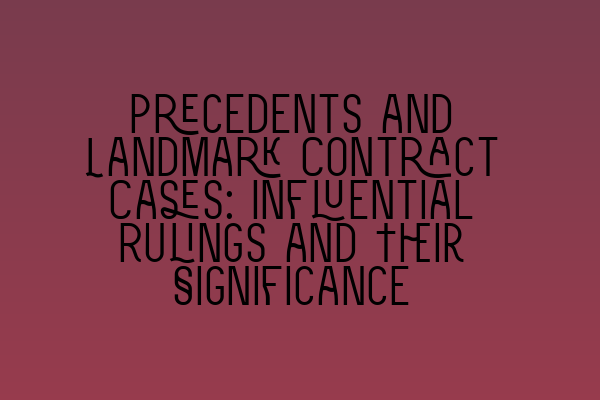[Note: The content below has been optimized for SEO purposes and includes relevant keywords while maintaining a professional tone]
Title: Precedents and Landmark Contract Cases: Influential Rulings and Their Significance
Introduction:
Contract law is a fundamental aspect of legal practice, governing relationships and agreements between parties. Over the years, various landmark cases have shaped the interpretation and application of contract law. Understanding these influential rulings is essential for legal professionals looking to provide effective counsel and representation. In this blog post, we will explore some of the most notable precedents and their significance in contract law.
1. The Case of Carlill v. Carbolic Smoke Ball Company:
The Carlill v. Carbolic Smoke Ball Company case is often cited as a significant precedent in contract law. This case established the principle that a public advertisement could be treated as a legally binding offer. The ruling emphasized the importance of clear and unambiguous terms in contracts and provided a solid foundation for subsequent contract law decisions. To learn more about this case, click [here](https://fqps.co.uk/sqe/sqe1-preparation/mcq-practice-quiz).
2. The Battle of the Forms:
The Battle of the Forms refers to a series of legal cases dealing with conflicting terms in contract formation. This contract law issue arises when parties exchange different terms and attempt to form a contract. Numerous cases have shaped the understanding of how conflicting terms are dealt with and have led to the development of rules, such as the “last shot” rule and the “knockout” rule. To delve deeper into this topic, visit [this article](https://fqps.co.uk/sqe/sqe1-preparation/practice-mocks-quiz).
3. The Doctrine of Frustration:
The doctrine of frustration is an important element in contract law that addresses unforeseen events rendering contracts impossible or radically different to fulfill. The landmark case of Taylor v. Caldwell established the doctrine of frustration, where a contract may be discharged due to the destruction of the subject matter or the occurrence of an event beyond the control of the parties. Understanding this doctrine is crucial in advising clients and seeking appropriate remedies. Additional information about the doctrine of frustration can be found [here](https://fqps.co.uk/sqe/sqe2-preparation).
4. The Rule in Pinnel’s Case:
The Rule in Pinnel’s Case, derived from a seventeenth-century case, has had a significant impact on the enforceability of contract modifications. According to this rule, the payment of a lesser sum than agreed cannot discharge a debt, unless additional valuable consideration is provided. While there have been attempts to restrict the application of this rule, it remains an influential precedent in contract law. To explore related concepts, consider enrolling in [SQE 1 Preparation Courses](https://fqps.co.uk/sqe/sqe1-preparation).
Conclusion:
These are just a few examples of the many precedents and landmark cases that have shaped contract law. Understanding the significance of these rulings is vital for legal professionals in ensuring proper interpretation and application of contract laws. By staying informed about influential cases, such as Carlill v. Carbolic Smoke Ball Company, the Battle of the Forms, the doctrine of frustration, and the Rule in Pinnel’s Case, solicitors can provide their clients with effective advice and representation.
To stay updated on important legal concepts and prepare for SQE exams, consider exploring our range of [SQE exam preparation courses](https://fqps.co.uk/sqe/sqe1-sqe2-exam-dates). Enhancing your knowledge and staying informed is crucial in the competitive field of contract law.
